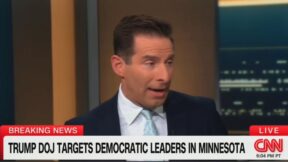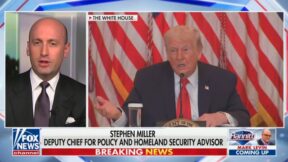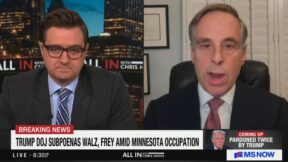‘Goebbels Would Appreciate That My Own Father Doesn’t Believe Me’: Ukrainian Man Shares How Putin’s Propaganda Misled His Dad in Russia
A Ukrainian restaurateur shared his frustrations with the effects Russian propaganda was having within his own family during an interview with Jim Acosta, telling the CNN Newsroom host that his father did not believe him that Russia was bombing Ukrainian cities.
In a now-viral Feb. 27 Instagram post, Misha Katsurin shared a photo with his father and wrote (according to Google Translate), “Goebbels would appreciate that my own father doesn’t believe me.” He described his father, who works as a security guard for a Russian monastery, as “a deeply religious person” and someone who frequently called him, but had not yet reached out since Russia’s invasion of Ukraine had begun.
Katsurin wrote that he described the invasion to his father, but he “replied that this was nonsense, there was no war, and the Russians were saving us from the Nazis, who were making human shields out of civilians. He also said that Russian soldiers give Ukrainian soldiers food and warm clothes.”
“My own father does not believe me, knowing that I am here and see everything with my own eyes, as well as that my mother (his ex-wife) is hiding with her grandmother in the bathroom because of the bombing,” Katsurin continued, expressing his frustration at how many Russians had been persuaded by propaganda to be “100% sure that we [Ukrainians] are Nazis, cannibals and scum.”
View this post on Instagram
Katsurin followed up with another Instagram post on Mar. 4 in which he shared a clip from a phone conversation with his father.
“Папа, поверь!” the caption begins, Russian for “Dad, believe me!” Katsurin wrote about how many people had shared his Feb. 27 post because they were in a similar situation. “[I]t turned out that almost everyone who has relatives in Russia faced a similar problem.”
“Call your loved ones in Russia!” he urged. “They were lied for 20 years. It’s hard for them. And it’s already scary. Help them, tell the truth. It will be difficult, they will not believe us…[b]ut lies can’t resist the truth.”
“When most relatives believe each other, the war will end!” was Katsurin’s hope. He added that he had tried again to talk to his father “[c]almly and without anger,” and he felt that the “ice” between them had “started” to thaw.
Katsurin wrote that he had created a website, papapover.com (English version here), to help other Ukrainians “convey the truth to your family in Russia” by sharing “recommendations ‘what to say’ and ‘what not to say’ so as not to quarrel even more, but on the contrary to hear each other.”
He encouraged his readers to call their relatives in Russia and share what had been effective with the hashtag #PapaPover. “Let everyone who has watched Russian TV for 20 years find out the truth!”
View this post on Instagram
In a segment on Sunday’s edition of CNN Newsroom, Katsurin told Acosta that his father lived in a small village in a remote area and didn’t use the internet, so the only media he could access was the state run television and newspapers.
Katsurin described how his father had argued with him and said no, Russia was not bombing you, it’s “peaceful” and “they’re trying to kick out the Nazi government from your country” and the Russian soldiers were giving warm clothes and food to the Ukrainian locals.
“I try to explain it’s not true,” said Katsurin, “and I’m here in Kyiv and see everything with my own eyes,” but his father didn’t believe him.
“That’s unbelievable,” said Acosta. “Let me ask you this. What do you think your father would say if he could see images we’ve all been seeing? You can see the reality on your television or on your phones, and what do you think he would say if he could see the same footage?”
Katsurin described the effect of decades of Russian propaganda as leaving people like his father “living in perverted reality.”
“I know that father loves me,” he continued. “I know that he wants to believe me, he just cannot. Because in his reality, that’s unbelievable. That’s all.”
He told Acosta about the reaction to his Instagram post, and how it made him realize that “millions of people had a similar problem,” which he called “totally horrible” for mothers to not believe their daughters, sisters to not believe their brothers.
Ukrainians were finding that their relatives in Russia had been brainwashed, “but, of course, they don’t think they are brainwashed, they think that we are brainwashed.”
Katsurin said that he realized that there were “more than 11 million relatives of Ukrainians in Russia…that’s a huge power,” and this motivated him to create the #PapaPover hashtag and website.
Personal stories, said Katsurin, were more effective in changing the minds of Russian relatives than even photos or videos from news footage, because they were dismissed as propaganda. Media reports about bombed-out civilian neighborhoods, even photos of dead children, didn’t work. In contrast, when Katsurin sent screenshots of the text message conversation he had with his mother about Russian military attacks on the civilian evacuation corridor, that was “impossible not to believe in” and now his father “understands that it’s a war, it’s not a special operation.”
Katsurin shared his optimism with Acosta about how he believed everything would be ok. But Ukrainians needed to reach out to their Russian relatives. “We need to call them, we need to try to help them,” he said. “Because they are also victims. They are victims of Russian aggression; they are victims of Russian propaganda.”
“They’re victims, too, and something that people don’t understand,” Acosta replied, “that, you know, they have been misled. They’ve been lied to on a massive scale, and it’s part of the reason why this is happening right now. If they could just get the truth, there might be hope for ending all of this.”
“Of course,” Katsurin agreed. “And with our relatives, we don’t need to break our relationships. We need to help them…we need to do it with love and through respect.”
Watch the video above, via CNN.





Comments
↓ Scroll down for comments ↓